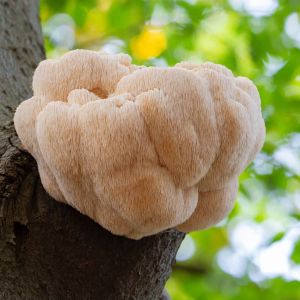What Are Lion’s Mane Mushrooms?
Lion’s mane mushrooms are big, white mushrooms that resemble a lion’s mane. Although they’re generally thought of as a single type of mushroom, there are three different species. Hericium erinaceus is the one that’s most widely available.
- Potential improvement of mild cognitive impairment
- Support for depression and anxiety symptoms
- Protection against stomach ulcers
- Improved heart health
- Management of diabetes symptoms
- Cancer prevention
- Lower inflammation markers
- Improved immune function
Lion’s mane mushrooms usually look like white pom-poms and are used as both food and medicine. They are extensively used in Asian countries such as Korea, Japan, India, and China. You can find lion’s mane mushrooms in grocery stores, restaurants, and supplement shops.
Lion’s mane mushrooms have a flavor that many describe as similar to seafood. They can be eaten raw, dried, or cooked. As a supplement, the mushroom comes in powders, liquids, and capsules. Lion’s mane mushrooms are rich in vitamins such as thiamine, riboflavin, and niacin. They are also a good source of essential minerals such as manganese, zinc, and potassium.
Lion’s Mane Benefits
Lion’s mane mushrooms have been used for centuries in Chinese medicine. Lab and animal studies suggest this traditional medicine may help with many conditions. But there’s limited research in humans, and no product made from the mushrooms has been approved for the treatment of any condition. The preliminary evidence suggests lion’s mane mushrooms might help in these ways.
…These statements have not been evaluated by the FDA. This product is not intended to diagnose, treat, cure, or prevent any disease. Always consult with your healthcare provider before beginning any new supplement regimen.
Fighting inflammation and free radicals
Many health conditions, including heart disease, arthritis, and cancer, involve chronic inflammation and the effects of unstable molecules in our bodies called free radicals. Lion’s mane mushrooms contain potentially potent antioxidants, which are substances that limit the damage of free radicals. They also contain anti-inflammatory substances that show promise in animal studies.
For example, in one study of 30 older adults with mild cognitive impairment, those who took tablets containing Hericium erinaceus powder for 4 months showed a temporary improvement on cognitive tests. The mushrooms have also been shown to slow Alzheimer’s symptoms and brain changes linked to the disease in mice.
In another small human study, younger adults who took capsules of lion’s mane mushroom powder showed improved mental performance speed.
Lab studies show the mushrooms are a good source of hericenones and erinacines, two chemicals that accelerate the growth of brain cells.





